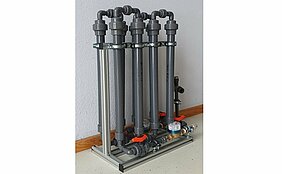The Project aimed on a general understanding of the effects of increased water temperatures on resilience and vulnerability of microbial communities within distribution networks in order to derive specific measurements to protect and preserve the drinking water quality.
Climate change causes new challenges for water suppliers in Germany but also globally. A key problem of climate change is the increase of water temperatures within distribution networks, which causes alterations and biological processes, which are not fully understood yet. In close cooperation with the DVGW project J201904, which focuses more on physical processes, this project aims on a better knowledge of the microbiological processes. Therefore, a broad microbiological monitoring programming involving different water suppliers all over Germany was conducted to reveal the current situation in German distribution networks. Furthermore, lab experiments and network model studies were performed to investigate specific aspects of increased water temperatures in controlled test environments. The overall aim was to evaluate the effects of increased water temperatures to specific microbiological parameters like heterotrophic plate counts, coliform bacteria, Enterococcus, Pseudomonas, Legionella, Aeromonas, total cell count and the total microbial community using molecular methods, in order to deduce specific measures for water suppliers and adapted current technical guidelines for future drinking water safety.
Publication
Rybicki, M.; Rink, M.; Müller, T.; Hermannspan, M.; Lohmann, M.; Petzoldt, H.; Hügler, M.; Korth, A.: Erhöhte Temperaturen in Verteilungsnetzen - Erste Ergebnisse der DVGW-Projekte. Veröffentlichungen aus dem Technologiezentrum Wasser 100, 129-146, ISSN 1434-5765 (2021)
Volumes from the TZW publication series can be purchased here.

![[Translate to English:] Prüfstelle-Produktprüfung_Teststand Test centre and product testing](/fileadmin/_processed_/0/9/csm_TZW-Karlsruhe_Pruefung_Geraete-Teststand_377188946c.jpg)

























